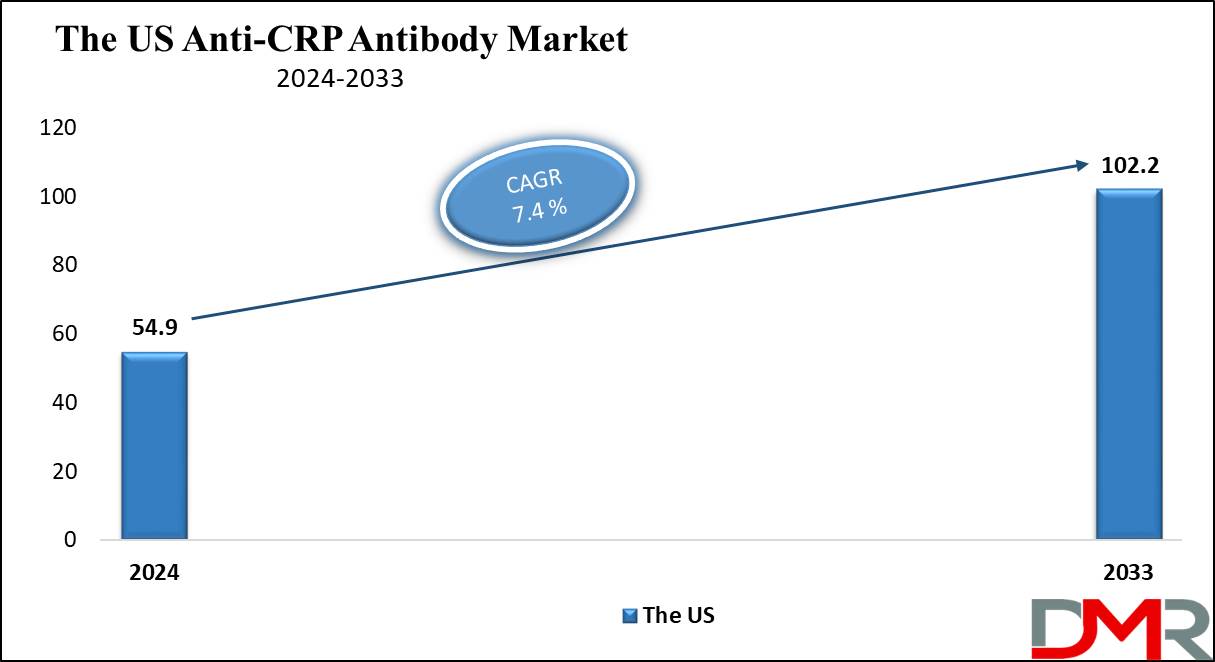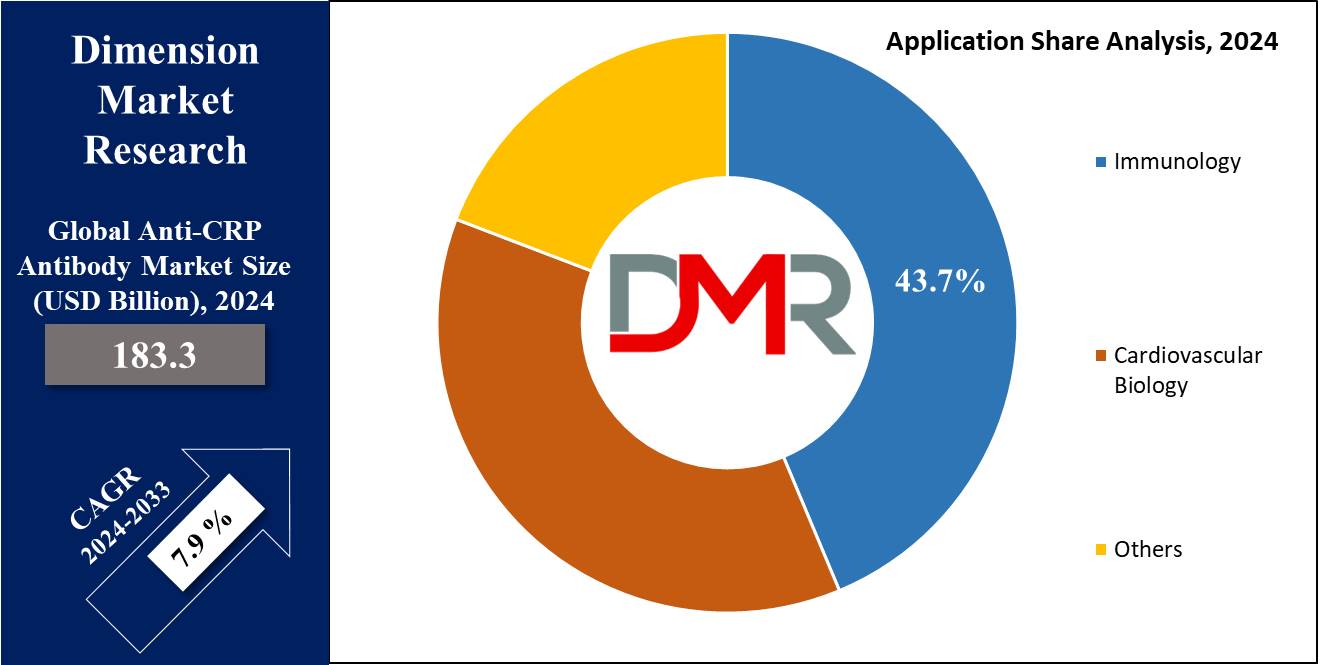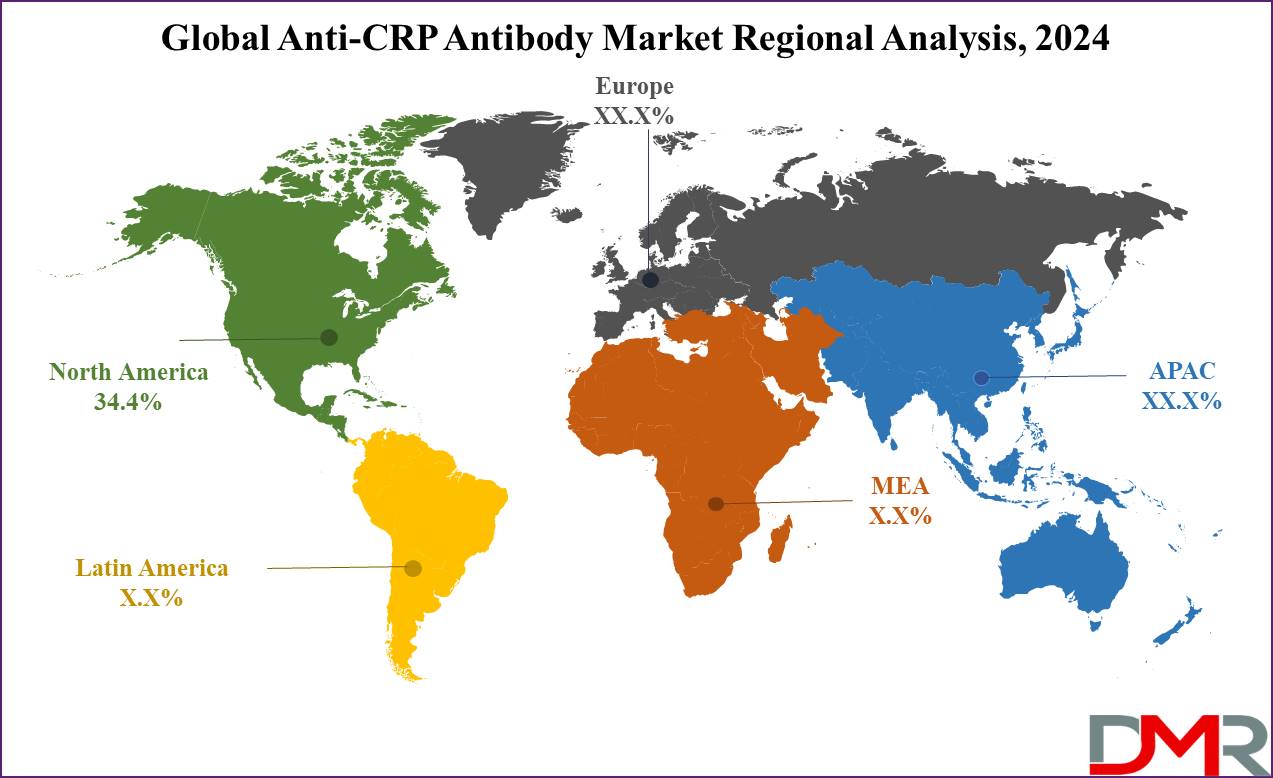Market Overview
Global
Anti-CRP Antibody Market is projected to reach
USD 183.3 million by the end of 2024 and grow exponentially until an anticipated value of
USD 363.1 million in 2033 at a
CAGR of 7.9%.
Anti-CRP antibodies are immunoglobulins particularly made to bind to C-reactive protein (CRP), a substance produced by the liver in response to inflammation. These antibodies are used in diagnostic tests to measure CRP levels in the blood. It helps identify and monitor inflammatory conditions, like infections, chronic diseases, and autoimmune disorders. Anti-CRP antibodies are often used in research and diagnostic tests to detect and quantify CRP levels.
The US Needle-free Injectors Market
The US Anti-CRP Antibody Market is expected to reach USD 54.9 million by the end of 2024 and is projected to grow significantly to an estimated USD 102.2 million by 2033, with a CAGR of 7.4%.

Rising awareness about early diagnosis and personalized medicine in the US also fuels market growth, as anti-CRP antibodies are important for detecting and monitoring inflammation. Increasing research funding and investments in diagnostic innovation support the development of novel anti-CRP antibody-based tests. Companies are focusing on developing novel antibody-based assays and expanding their product portfolios to cater to diverse diagnostic needs.
Key Takeaways
- Market Growth: The global Anti-CRP Antibody Market is expected to grow by USD 166.9 million, at a CAGR of 7.9 %, during the forecasted period i.e. from 2025 to 2033.
- Market Definition: Anti-CRP Antibodies are specialized proteins designed to bind specifically to C-reactive protein, an inflammatory marker.
- Type Analysis: In terms of type, Monoclonal Antibody is predicted to lead the global market with a high revenue share in 2024.
- Application Analysis: Immunology is forecasted to be one of the leading application segments in the global market in 2024.
- Regional Analysis: North America is predicted to dominate the global Anti-CRP Antibody market with the highest market share of 34.4 % in 2024.
Use Cases
- Diagnostic Tool for Inflammatory Diseases: Anti-CRP antibodies are used in diagnostic assays to identify and monitor inflammatory diseases as C-reactive protein is a marker of systemic inflammation produced by the liver in response to inflammatory stimuli.
- Monitoring Treatment Efficacy in Autoimmune Diseases: Anti-CRP antibodies are employed to gauge the effectiveness of therapeutic interventions in autoimmune diseases, like rheumatoid arthritis or systemic lupus erythematosus as levels of CRP often correlate with disease activity and inflammation.
- Investigating Infection-Related Inflammation: CRP levels typically rise in response to infections, making it a useful marker for detecting bacterial, viral, or fungal infections. Healthcare providers can identify the presence of infection and monitor the inflammatory response by utilizing anti-CRP antibodies in diagnostic assays
- Research in Chronic Inflammatory Conditions: Anti-CRP antibodies are employed to study chronic inflammatory conditions such as chronic obstructive pulmonary disease (COPD) or psoriasis.
Market Dynamic
Drivers
Increasing Prevalence of Chronic Inflammatory DiseasesThe rising cases of chronic inflammatory conditions like rheumatoid arthritis, and cardiovascular diseases significantly drive the demand for anti-CRP (C-reactive protein) antibody industry. This market is expanding due to the growth of the aging population, which is more susceptible to these chronic inflammatory conditions.
Advancements in Diagnostic Technologies
Innovations in diagnostic technologies, including high-sensitivity assays and advanced imaging techniques, improved the detection and quantification of CRP levels. These advancements provide more precise and timely diagnosis of inflammatory diseases, thus driving the adoption of anti-CRP antibodies. Adopting these technologies in point-of-care and home diagnostics makes CRP testing more accessible and convenient, further propelling market growth.
Opportunities
Development of Personalized Medicine
Personalized medicine offers a great opportunity for the anti-CRP antibody market as personalized medicine focuses on tailored treatments based on individual patient profiles, the demand for specific biomarkers like CRP increases. Anti-CRP antibodies can be important in developing customized therapeutic approaches and monitoring treatment efficacy. Collaborations between pharmaceutical and diagnostic firms to develop companion diagnostics can further leverage this opportunity, driving market growth.
Trends
Integration of Artificial Intelligence in Diagnostics
The incorporation of artificial intelligence and machine learning in diagnostic processes is a significant trend in the anti-CRP antibody market. AI and ML algorithms can analyze large datasets, identify patterns, and predict disease progression, enhancing the accuracy and efficiency of CRP testing. This technological integration aids in early diagnosis, personalized treatment plans, and continuous monitoring of inflammatory diseases making anti-CRP antibody-based diagnostics more effective and widely adopted.
Restraints
High Cost of Advanced Diagnostic Tools
The high cost associated with advanced diagnostic tools and technologies, including anti-CRP antibody equipment, is restraining the growth of the market. It could be costly for many healthcare providers, particularly in low- and middle-income countries. Additionally, the high cost limited the global adoption of these advanced diagnostics, posing a challenge to market growth.
Research Scope and Analysis
By Type
Monoclonal Antibody is likely to dominate the Anti-CRP Antibody market with the best revenue proportion in 2024. These antibodies are extraordinarily specific, targeting a single epitope on the CRP molecule, which guarantees excessive precision and consistency in diagnostic tests. These antibodies are produced in large quantities with uniform best, ensuring steady performance throughout extraordinary batches. Uniform consistency is crucial for diagnostic packages for particular sizes of CRP ranges which is needed to screen infection and manual treatment decisions.
Production of monoclonal antibodies is efficient and value-effective because of advancements in biotechnology which will increase their accessibility and adoption. Rising instances of continual inflammatory conditions and the growing old population growth the demand for correct and reliable diagnostic tools like monoclonal antibodies which is predicted to force the growth of the market.
The polyclonal antibody is developing at the highest rate because of its capability to apprehend multiple epitopes on the CRP molecule, presenting a more complete detection of CRP ranges. These are typically more cost-effective and quicker to provide than monoclonal antibodies, offering a cheap alternative for various applications.
By Application
Immunology is predicted to dominate the Global Anti-CRP Antibody Market with the largest market percentage in 2024, due to its important role in diagnosing and coping with inflammatory illnesses. C-reactive protein is a biomarker of irritation, and increased stages can indicate numerous inflammatory conditions. Anti-CRP Antibodies are used significantly to recognize and measure infection, assisting with the analysis and tracking of illnesses like rheumatoid arthritis, lupus, and different autoimmune problems.

More unique and sensitive anti-CRP antibodies are growing due to advancements in immunological research and the growing attention to precision medication, which drives the growth of the market. Cardiovascular biology is the second maximum critical application of the anti-CRP antibody market as those antibodies are used to analyze cardiovascular sicknesses, where CRP tiers can be indicative of underlying problems like atherosclerosis or myocardial infarction.
The growing occurrence of cardiovascular illnesses contributes to the multiplied demand for anti-CRP antibodies in this discipline. Cardiovascular situations are a leading motive of morbidity and mortality, prompting ongoing studies to better apprehend their pathophysiology and improve diagnostic and prognostic tools.
The Global Anti-CRP Antibody Market Report is segmented based on the following
By Type
- Monoclonal Antibody
- Polyclonal Antibody
By Application
- Immunology
- Cardiovascular Biology
- Others
Regional Analysis
North America is expected to lead the global anti-CRP antibody market with an expected revenue
share of 34.4% by 2024, due to its well-developed healthcare system that uses cutting-edge technology for diagnosis and treatment protocols - a factor that fuels market expansion. Additionally, chronic diseases & conditions, cardiovascular diseases, and autoimmune disorders prevalent in this region that involve elevated CRP levels have spurred market expansion for diagnostic & research applications.

This region is recognized as an innovator in biomedical research due to the presence of top research institutions and pharmaceutical companies, which promote innovation. Their intense healthcare spending allows access to advanced diagnostic tests and treatments which creates demand for anti-CRP antibody products.
Europe
- Germany
- The U.K.
- France
- Italy
- Russia
- Spain
- Benelux
- Nordic
- Rest of Europe
Asia-Pacific
- China
- Japan
- South Korea
- India
- ANZ
- ASEAN
- Rest of Asia-Pacific
Latin America
- Brazil
- Mexico
- Argentina
- Colombia
- Rest of Latin America
Middle East & Africa
- Saudi Arabia
- UAE
- South Africa
- Israel
- Egypt
- Rest of MEA
Competitive Landscape
The anti-CRP antibodies thus form one such segment with a medium dispersion that gets multiplied manifold with time due to higher dispersions. Product innovation and mergers and acquisitions to enhance the functionality of the portfolio have been the key strategies adopted by the major players in the market to sustain competition. The pharmaceutical and biotechnological companies thereby surpass this segment through their high capability in developing and commercializing the antibodies.
Companies such as LifeSpan BioSciences, Boster Bio, and Novus Biologicals have a market stronghold with their diversified diagnostic and therapeutic antibodies. At the same time, upcoming biotech companies are pushing through the development of state-of-the-art solutions and technologies, while their attention toward targeted therapies and advanced diagnostic tools drives innovation and enhances market competition.
Some of the prominent players in the Global Anti-CRP Antibody market are
- LifeSpan BioSciences
- Bioss Antibodies
- Aviva Systems Biology
- Boster Bio
- Biorbyt Ltd
- Thermo Fisher Scientific
- ProSci
- Novus Biologicals
- EpiGentek
- Elabscience Biotechnology Inc.
- Leading Biology
- Others
Recent Development
- In August 2024, BioTech Innovations Inc. launched a high-sensitivity Anti-CRP antibody-based assay for early-stage inflammatory diseases.
- In June 2024, ImmunoTech Labs partnered with Genomics Research Institute to develop a novel Anti-CRP antibody with enhanced specificity for multiplex diagnostic platforms.
- In April 2024, Diagnostic Solutions Ltd. received regulatory approval for an updated Anti-CRP antibody test with improved accuracy and reduced turnaround time.
- In February 2024, Precision Biologics published a study on the potential of Anti-CRP antibodies in predicting disease flare-ups in chronic inflammatory conditions.
- In December 2023, Health Diagnostics Corp. launched a new line of Anti-CRP antibodies with enhanced stability for use in remote settings.
Report Details
| Report Characteristics |
| Market Size (2024) |
USD 183.3 Mn |
| Forecast Value (2033) |
USD 363.1 Mn |
| CAGR (2024-2033) |
7.9% |
| Historical Data |
2018 – 2023 |
| The US Market Size (2024) |
USD 54.9 Mn |
| Forecast Data |
2025 – 2033 |
| Base Year |
2023 |
| Estimate Year |
2024 |
| Report Coverage |
Market Revenue Estimation, Market Dynamics, Competitive Landscape, Growth Factors and etc. |
| Segments Covered |
By Type (Monoclonal Antibody, and Polyclonal Antibody), By Application (Immunology, Cardiovascular Biology, and Others) |
| Regional Coverage |
North America – The US and Canada; Europe – Germany, The UK, France, Russia, Spain, Italy, Benelux, Nordic, & Rest of Europe; Asia- Pacific– China, Japan, South Korea, India, ANZ, ASEAN, Rest of APAC; Latin America – Brazil, Mexico, Argentina, Colombia, Rest of Latin America; Middle East & Africa – Saudi Arabia, UAE, South Africa, Turkey, Egypt, Israel, & Rest of MEA
|
| Prominent Players |
LifeSpan BioSciences, Bioss Antibodies, Aviva Systems Biology, Boster Bio, Biorbyt Ltd, Thermo Fisher Scientific, ProSci, Novus Biologicals, EpiGentek, Elabscience Biotechnology Inc., Leading Biology, and Other Key Players |
| Purchase Options |
We have three licenses to opt for: Single User License (Limited to 1 user), Multi-User License (Up to 5 Users) and Corporate Use License (Unlimited User) along with free report customization equivalent to 0 analyst working days, 3 analysts working days and 5 analysts working days respectively. |
Frequently Asked Questions
The Global Anti-CRP Antibody Market size is estimated to have a value of USD 183.3 million in 2024 and is expected to reach USD 363.1 million by the end of 2033.
North America is expected to be the largest market share for the Global Anti-CRP Antibody Market with a share of about 34.4 % in 2024.
Some of the major key players in the Global Anti-CRP Antibody Market are LifeSpan BioSciences, Boster Bio, and Novus Biologicals, and many others.
The market is growing at a CAGR of 7.9 percent over the forecasted period.
The US Market size is estimated to have a value of USD 54.9 million in 2024 and is expected to reach USD 102.2 million by the end of 2033.